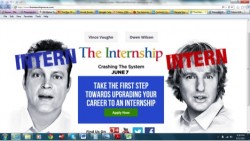 There are many strategies to build a healthy employment brand: promoting jobs with social media such as your Facebook page; LinkedIn ad impressions; hiring events; recruitment videos of your CEO, and so on. Celebrities have not really been part of employment branding strategies. That changed with Google as is showcased in the new Vince Vaughn movie The Internship. We may be seeing another strategy developing that is out of box and a breath of fresh air.
There are many strategies to build a healthy employment brand: promoting jobs with social media such as your Facebook page; LinkedIn ad impressions; hiring events; recruitment videos of your CEO, and so on. Celebrities have not really been part of employment branding strategies. That changed with Google as is showcased in the new Vince Vaughn movie The Internship. We may be seeing another strategy developing that is out of box and a breath of fresh air.
For hiring, it’s unlikely to surpass using LinkedIn or postings, but for some companies, it may become another strategy in their toolkit.
Not a spoiler alert: The Internship is a comedy. The movie is witty, making many references to 1980s pop, geek, and Silicon Valley culture. It is an underdog story where Vince Vaughn and Owen Wilson decide to apply for jobs at Google. They are friends and old-school sales pros in their forties who get laid off due to the new economy and resolve to become interns at the tech giant to start anew. Its satire comes from Vaughn and Wilson competing against uber-competitive, brilliant fresh-faced, millenials-techies to advance in the company .
“The Internship” is relentless product placement on Google’s behalf with the prize being a coveted “job.” The movie pumps endless positive Google employment branding onto an unwitting audience. Google co-founder Sergey Brin checked on the film’s set, so there was executive involvement in the movie. At the end of the movie, you want to work for Google. I did. Google was willing also to poke fun at itself — it was part of its own parody. For that, it deserves a lot of credit. Millenials relate to this type of humor and it shows. Google can laugh at itself in a mature way.
More serious movies do the same with this workforce placement approach. Zero Dark Thirty and Argo can act as recruitment tools for the CIA.
This workforce placement versus product placement is in embryonic stages but I predict it will grow. Hollywood uses product placement to help defray the high costs of making entertainment. Product placement is no longer just in movies but in books, video games, TV shows. It’s growing
Product placement isn’t anew concept, having becoming more prominent since the 1980s. You’ll probably recall at least a few of these now-famous product placements:
- Risky Business – Ray-Ban sunglasses
- Back to the Future – Pepsi products
- You’ve Got Mail – AOL, Apple, IBM, and Starbucks
- Austin Powers – Pepsi and Starbucks
- Cast Away – FedEx and Wilson
- Men in Black II – Ray-Ban sunglasses, Mercedes, Sprint, Burger King
This is the first time the focus was on employment branding vs. pure product branding in a comedic film. Cast Away put FedEx in a positive light as a company to work but everything else is pure product-sales focused.
Back in the 2000s, Cisco was exploring this strategy of partnering with Hollywood to support branding efforts of a great place to work. It went a different direction with a focus on its products, and today most Americans don’t know what Routers are but have a positive view of Cisco.
WellPoint has a relationship with the show The Biggest Loser, aligned to promoting wellness objectives about having a healthier workforce. TV shows are putting the workplace under scrutiny — Undercover Boss is one example. There was a reality show on Bravo that flopped about a LA headhunter, so we’re still in early days.
Translating employment branding placement will be trickier than basic product placement. Companies don’t want to cede control of their image. Using celebrities has its downside. The cost can be high and legal & HR departments are concerned about image and liability. Challenges occur when a celebrity brand is tarnished, which could impact the company’s brand. No one will be hiring Lindsay Lohan as a workplace advocate.
Ozzy Osborne telling people to work at Wal-Mart isn’t going to happen but a quirky Zoe Deschanel staring into a camera and talking about how she has met employees at for example, Zappos, and think it’s an awesome place to have a career could make sense. The personality/image of the celebrity has to align to the company.
Another strategy could be to have positive employment branding references in movies. Envision Jessica Biel or Ben Affleck stating as part of the script that working for Mayo Clinic gives his life purpose or their favorite job ever was at Starbucks. That plug could be a 50 percent increase in applications to the website. Translating to quality may be another topic.
I know of a Silicon Valley recruitment company with an office in LA that has entertainment connections due to hiring at companies like Disney & Fox Studios. It is working with a few companies connecting publicists and agents to build workforce branding placement strategy, but it’s not an area that is really developed. Most companies that express an interest are startups. I’m sure the recruitment advertising agencies will jump into this space also.
We know there’s an ROI with positive employment brand and profitability. Proving this for your company and then putting the right strategy would a sound approach and it may include using celebrities. Proceed with caution and hopefully some brave HR souls will dip their toes in these unclear waters and I hope they succeed.